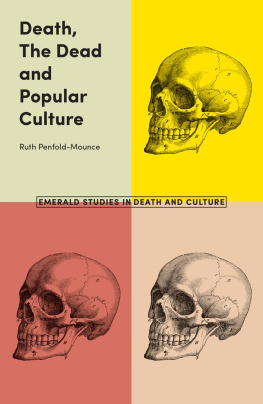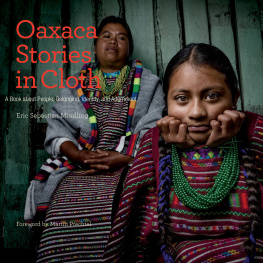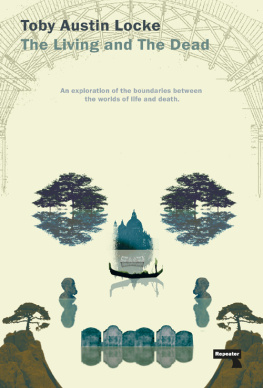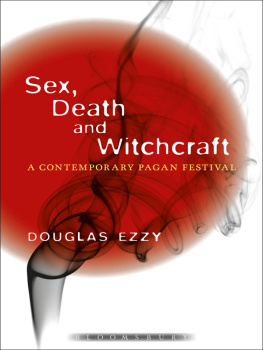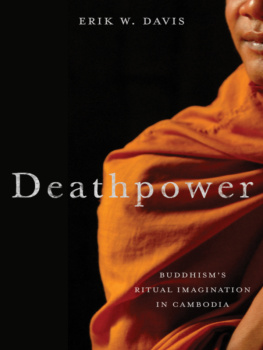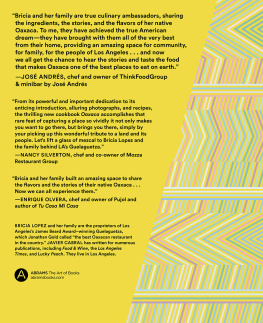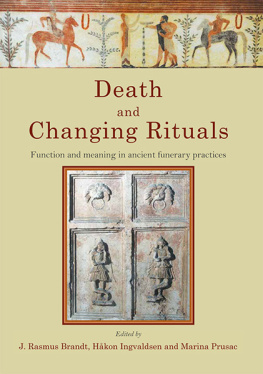COLUMBIA UNIVERSITY PRESS
Publishers Since 1893
NEW YORK, CHICHESTER, WEST SUSSEX
cup.columbia.edu
Copyright 2006 Columbia University Press
All rights Reserved
E-ISBN 978-0-231-51014-1
Library of Congress Cataloging-in-Publication Data
Norget, Kristin.
Days of death, days of life : ritual in the popular culture of Oaxaca / Kristin Norget.
p. cm.
Includes bibliographical references and index.
ISBN 0231136889 (cloth : alk. paper)
ISBN 0231136897 (pbk. : alk. paper)
1. All Souls DayMexicoOaxaca de Jurez.
2. Funeral rites and ceremoniesMexicoOaxaca de Jurez.
3. Oaxaca de Jurez (Mexico)Social life and customs.
I. Title
GT4995.A4N67 2006
394.266097274dc22 2005051850
A Columbia University Press E-book.
CUP would be pleased to hear about your reading experience with this e-book at .
T HIS BOOK REPRESENTS a long journey; the path has not always been straight or always smooth. I want to acknowledge the many people who have accompanied me along the way.
How did I end up in such a welcoming neighborhood? The gods were surely smiling on me. My greatest debt of gratitude goes to those who gave so much of themselves to welcome so warmly a stranger into their midst: muchsimas gracias, especially, to Mara de Jesus (Chucha) Cruz Ortiz and family, Lidia Blas Cruz and family, Lupe Mendoza, Reynaldo Cabrera, Mauro Cruz, Avelia Mandonado, doa Otilia Sandoval, Fezali Zavaleta, Marino Betanzos, Elias Betanzos, Candelaria Maldonado, Jos Zarate, Rosa Trujillo, Francisco and Gustavo, Alfonso Santiago, and Padre Hermenegildo Prez.
Heartfelt gracias to my comadre, Valeriana Pizarro, and family: Paulino, Camilo, Claudio, Tiburcio (!), Felix, Telsforo, and dear Patricia, whose deep intelligence and love have taught me much about resilience, spirit, and extraordinary solidarity and the possibilities of what a family can be. Life in Oaxaca would not have been the same without Dorothy Cline, a source of great wisdom and emotional support as both friend and mother. Since those early days, Jayne Howell has shared with me the delight, humor, and sorrows of life in Oaxaca. I admire her spirit and courage. Michael Higgins, Art Murphy, Ramona Prez, Martha Rees, Lois Wasserspring, Ronald Waterbury, Jack Corbett, and Jorge Hernndez have for many years represented for me a terrific and supportive community of fellow Oaxacanistas.
My graduate research in Oaxaca benefited tremendously from the resources at the Instituto Welte de Estudios Oaxaqueos, including the sound points of guidance and efficient help offered by Cecil Welte and Ursula Greenberg. From its beginnings in the cramped quarters above the pizza place on the Andador, to its current site in the north of the city, the Welte has evolved into a vital research center for serious scholars of Oaxaca. I have relied regularly on the aid and friendship of its librarian, Gudrun Dohrmann. I also wish to thank the Department of History at the Universidad Autnoma Benito Jurez de Oaxaca for inviting me to become an affiliate during the initial phase of my research. Of particular help were the departments administrative assistants, who patiently transcribed some of my interview material. Enrique Marroqun was a gracious and encouraging guide when I was struggling to understand the enigmatic complexities of religion, and the Catholic Church, in Oaxaca.
Muchas gracias also to Padre Juan Ruiz, Padre Wilfrido Mayrn, and Madre Guadelupe Corts. I am proud to consider them among my friends. I also want to thank Sergio Snchez, Rosa and Luis Arroro, Eustolia Snchez, Raul Herrera, David Poisal, Lowell Greenberg, and Sergio Btizall of whom understand why Oaxaca is the place where I am always renewed.
I owe a special debt to Amparo Rodriguez, who on a cold, rainy day in London introduced me to the Day of the Dead and to the other side of the fiesta that was not represented by the colorful objects of folk art in the glass cases of a somewhat sterile museum atmosphere. There are many people I appreciate from my early graduate student days; they left an indelible mark on me in ways they may not realize. Part of my contentedness at the Department of Social Anthropology at Cambridge University was due to the positive and supportive atmosphere of a vibrant and dynamic community of scholars. Thanks particularly to my supervisor, Stephen Hugh-Jones, who was a great teacher, inspiration, and example. Peter Wade was important to me as friend and adviser, as was David Lehmann. Keith Hart and his iconoclastic spirit arrived back in Cambridge, just as I was finishing writing up my dissertation, to inspire a critical (re)engagement with anthropology that I still nurture. I am also grateful to Anita Herle at the Cambridge Museum of Anthropology, Elizabeth Carmichael at the Museum of Mankind, Susana Rostas, Valentina Napolitano, the late Ernest Gellner, and Robin and Catherine Porteous. Other members of my graduate cohort provided provocative discussion as well as friendship. Special thanks to Andr Czegledy, Nicole Toulis, and Louise de la Gorgondire. Nicholas Rhl and Rebecca Porteous were steadfast and generous friends who added much to my life in England.
I want to express my appreciation to Eric Worby, Janalyn Prest, Sean Brotherton, Bob White, John Hall, and the staff and colleagues in the Department of Anthropology at McGill University, especially John Galaty, Bruce Trigger, Mike Bisson, and Sandra Hyde, and the wise counsel of Ellen Corin, Laurence Kirmayer, and the wonderful Rose Marie Stano. It has made a huge difference to have near me fellow Latin Americanists who are both excellent scholars and generous people: thanks to Phil Oxhorn and Daviken Studnicki-Gizbert, and especially Catherine LeGrand, for their enduring support, encouragement, and friendship. Pierre Beaucage at the University of Montreal has been an exceptional mentor, colleague, and friend in both Montreal and Mexico. The formidable combination of his razor-sharp mind, rich experience, and generous social consciousness makes him a great anthropologist and rare human being; I have learned much from him. Igor Ayora and Gabriela Vargas have been sources of inspiration and companionship at critical moments over the past decade.


